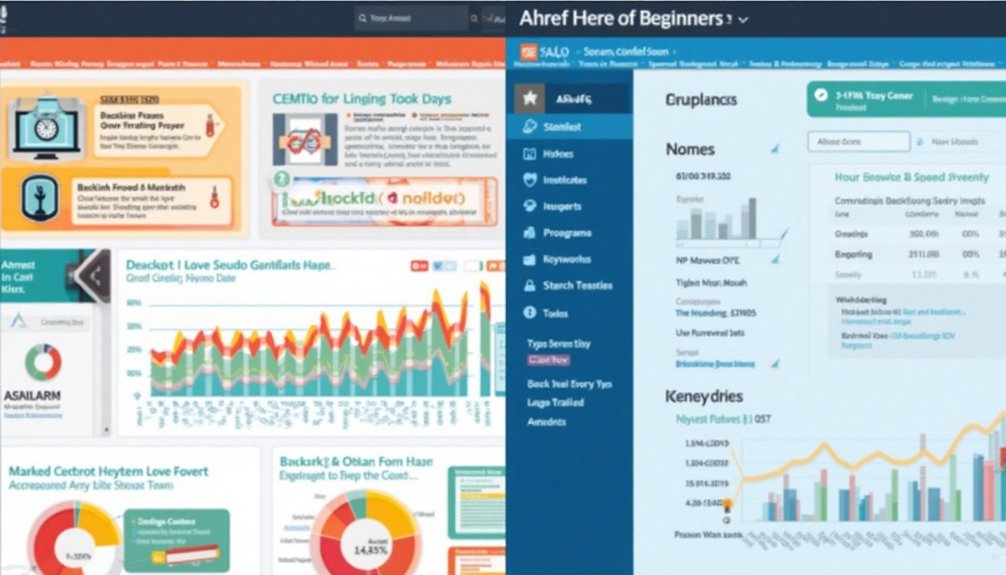As I explored the digital marketing landscape, I often found myself weighing the advantages of SEMRUSH against Ahrefs. Each platform has distinct features that can significantly influence your SEO and marketing strategies. Whether you’re keen on in-depth keyword research or comprehensive backlink analysis, your specific needs will steer the decision. But which one aligns best with your goals? Let’s unpack the unique offerings of both tools.
Key Takeaways
- SEMRUSH offers a user-friendly interface and features like keyword research and site audits, ideal for beginners in digital marketing.
- Ahrefs focuses on backlink analysis and content exploration, providing valuable insights for SEO newbies.
- Both tools provide free trials, allowing beginners to explore features without financial commitment.
- SEMRUSH is excellent for traffic analytics and identifying competitors’ strategies, while Ahrefs excels in content performance tracking.
- Beginners benefit from their extensive support resources, tutorials, and active community forums available in both tools.
Overview of SEMRUSH

When diving into SEMRUSH, I quickly realized it’s more than just a tool—it’s an all-in-one solution for digital marketing.
From keyword research to site audits, it covers everything I need to boost my online presence. The interface is user-friendly, allowing me to navigate seamlessly through different features. I appreciate its comprehensive analytics that help me track my competitors and refine my strategies.
Plus, the SEO content tools make it easier to create optimized articles. SEMRUSH also offers valuable insights into PPC campaigns, social media performance, and brand monitoring, making it indispensable for anyone serious about digital marketing.
Overview of Ahrefs

Ahrefs stands out as a robust SEO tool that I’ve found invaluable for optimizing my digital marketing efforts. This platform offers a comprehensive suite of features designed to enhance keyword research, backlink analysis, and content exploration.
One of the things I love most is its user-friendly interface, making it easy for beginners like me to navigate through various reports. The data is extremely detailed, enabling me to track my website’s performance effectively.
Ahrefs’ site audit tool helps identify issues that may hinder my SEO efforts. Plus, the keyword explorer is a treasure trove for finding new opportunities.
Key Features of SEMRUSH

SEMRUSH is a powerful SEO toolkit that I’ve come to rely on for my marketing strategies. One of its standout features is the comprehensive keyword research tool, which helps me identify high-performing keywords and analyze competitors’ strategies.
The site audit feature gives me insights into my website’s health, highlighting issues like broken links and SEO errors that I need to fix. I love the traffic analytics tool, allowing me to see my competitors’ traffic sources and user behavior, which helps me refine my approach.
Finally, the content marketing tool offers topic suggestions based on current trends, making it easier to craft engaging content. Overall, SEMRUSH makes SEO management straightforward and data-driven, which I appreciate in my work.
Key Features of Ahrefs

While exploring the world of SEO tools, I’ve found Ahrefs to be an impressive contender.
One standout feature is its extensive backlink analysis. Ahrefs provides a comprehensive view of your website’s link profile, showing which sites link to you and helping identify potential opportunities.
Their keyword explorer is another highlight—I appreciate how it digs deep into keyword difficulty and search volume, enabling me to make informed decisions.
The site audit tool is invaluable too, as it scans my site for SEO issues, offering actionable insights for improvement.
Plus, Ahrefs’ content explorer lets me find popular content ideas based on social shares and backlinks, which sparks creativity for my own projects.
User Interface Comparison

When I compare the user interfaces of SEMRUSH and Ahrefs, I can’t help but notice how each tool presents its data.
The dashboard layout, ease of navigation, and visual data presentation really impact how I interact with these platforms.
Let’s explore how they stack up against each other in these key areas.
Dashboard Layout Analysis
Navigating the user interface of SEMRUSH and Ahrefs reveals distinct approaches to dashboard layout, each catering to different user needs.
SEMRUSH has a more comprehensive dashboard, which can feel busy at first. It displays a wealth of information in widgets, giving you a quick overview of various metrics. I find it helpful for both beginners and advanced users, as the customization options allow me to prioritize what I want to see.
On the other hand, Ahrefs offers a cleaner, more minimalist layout. It focuses on essential data, making it easier for me to find what I’m looking for without feeling overwhelmed.
I appreciate how straightforward their navigation is, as it highlights the most critical tools right away, enhancing the overall user experience.
Tool Navigation Ease
Both SEMRUSH and Ahrefs strive to provide intuitive navigation, but they cater to different preferences. When I first used SEMRUSH, I appreciated how the menu options are clearly organized. It felt user-friendly, making it easy to find what I needed quickly, even as a beginner.
On the other hand, Ahrefs offers a more straightforward, no-frills approach. While its layout may seem simpler, I found it slightly less visually engaging at first. However, once I got accustomed to it, I realized finding specific tools or reports became second nature.
Ultimately, it boils down to what feels comfortable; SEMRUSH might appeal to those who love vibrant dashboards, while Ahrefs suits those seeking a minimalist interface.
Visual Data Presentation
The way SEMRUSH and Ahrefs display their data significantly impacts the user experience. I’ve found SEMRUSH’s interface to be colorful and engaging, which makes analyzing information more enjoyable. The graphs and charts are intuitive, helping me quickly grasp complex data.
In contrast, Ahrefs presents a cleaner, minimalist design. While it may seem less flashy, I appreciate its straightforwardness. The visual organization feels logical, allowing me to navigate without feeling overwhelmed.
In my experience, both tools have their strengths; it just depends on your preference. If you lean towards visual appeal, SEMRUSH might win you over. But for simplicity and efficiency, Ahrefs excels.
Ultimately, it’s about which presentation style resonates more with your workflow.
Pricing Models

When it comes to pricing models, both SEMRUSH and Ahrefs offer several subscription plans that cater to different budgets and needs.
I’m excited to explore how their free trial options work, as this can be a game-changer for beginners like us.
Let’s see which platform provides the best value for money!
Subscription Plans Comparison
While considering which tool to invest in, understanding the subscription plans for SEMRUSH and Ahrefs is essential.
SEMRUSH offers three main plans: Pro, Guru, and Business, each varying in price and features suited for different user needs. The Pro plan is perfect for freelancers and startups, while the Guru plan includes additional reporting features, ideal for small to medium businesses.
On the other hand, Ahrefs has four pricing tiers: Lite, Standard, Advanced, and Agency. Their plans focus on providing robust data, making them an excellent choice for serious SEO professionals.
Both tools offer annual billing discounts, so it’s worth checking their pricing pages to find the best fit for your budget and requirements.
Free Trial Options
Comparing subscription plans is just the beginning; free trial options can be a great way to test out both SEMRUSH and Ahrefs before committing to a paid plan.
SEMRUSH offers a seven-day free trial that lets you explore its extensive features, which is perfect for getting a feel for the platform.
On the other hand, Ahrefs trial option isn’t free, but they offer a discounted $7 trial for seven days. This gives you access to their powerful tools, ideal for beginners like me who want to dive deep.
I appreciate these trial offers because they help me understand what I need in a tool without rushing into a commitment.
Data Accuracy and Reliability

In the realm of SEO tools, the accuracy and reliability of data can make or break your strategy. I’ve used both SEMRUSH and Ahrefs, and I’ve found that their data integrity plays a crucial role in my decision-making.
Ahrefs tends to offer more accurate backlink data, which is essential for my link-building efforts. On the other hand, SEMRUSH excels in keyword data, giving me insights into organic traffic trends.
However, I’ve noticed some discrepancies in keyword volumes depending on the tool. Both tools continuously update their databases, but I prioritize consistency.
In my experience, I can trust Ahrefs for backlink analysis and SEMRUSH for traffic insights, making them valuable in different aspects of SEO.
Customer Support and Resources

Data accuracy is important, but having solid customer support and resources can elevate your experience with SEO tools.
Both SEMRUSH and Ahrefs offer robust customer support, but their approaches differ.
SEMRUSH excels with its extensive knowledge base, tutorials, and active community forums. You’ll find plenty of resources to help you solve problems and learn the ins and outs of the platform.
On the other hand, Ahrefs provides excellent email support and a well-organized help center, which I found helpful when I’d questions. They also regularly update their blog with actionable tips, which I appreciate.
Ultimately, I think both platforms offer valuable support and resources, making them effective allies in your SEO journey.
Use Cases for SEMRUSH

When I explore SEMRUSH, I find its keyword research tools incredibly helpful for uncovering search terms that can boost my content.
The platform also makes competitor analysis a breeze, allowing me to see what’s working for others in my niche.
These features really stand out, especially for beginners looking to make their mark online.
Keyword Research Tools
Five key use cases for SEMrush’s keyword research tools can significantly enhance your SEO strategy.
First, I love discovering high-volume keywords relevant to my niche, ensuring I target what users are actually searching for.
Second, the tool helps me identify long-tail keywords that often have lower competition, making it easier to rank.
Third, I can check keyword difficulty scores, which guides me in choosing the right keywords based on my site’s authority.
Fourth, SEMrush allows me to explore related keywords, giving me more content ideas to broaden my reach.
Lastly, I analyze seasonal trends in keyword popularity, helping me tailor my strategy and content calendar effectively.
These features make SEMrush an invaluable asset for optimizing my keyword approach.
Competitor Analysis Features
Understanding your competition is crucial in the digital landscape, and SEMrush’s competitor analysis features make this process straightforward. I’ve found the tool invaluable for uncovering key insights about my competitors’ strategies.
With the Domain Overview feature, I can quickly assess their traffic, top keywords, and backlink profiles. The Traffic Analytics tool reveals where their audience comes from and how engaged they are.
I love using the Organic Research feature to discover which keywords they’re ranking for that I might be missing out on. Additionally, the Position Tracking feature lets me monitor my ranking against theirs over time.
This holistic view helps me refine my strategy and stay competitive in a crowded market.
Use Cases for Ahrefs

Ahrefs offers a variety of use cases that cater to both newcomers and experienced marketers alike, making it an invaluable tool in the SEO toolkit.
Personally, I’ve found its keyword research features incredibly helpful. By entering a topic, I can uncover a wealth of related keywords and their search volumes.
Plus, the Content Explorer tool allows me to analyze what content performs best in my niche, giving me ideas and inspiration.
I also use Ahrefs for backlink analysis, which helps me understand the strength of my competitors’ profiles.
Regularly monitoring my own site’s health through the Site Audit feature keeps me on track.
With these applications, Ahrefs truly enhances my SEO strategy and efficiency.
Conclusion
In choosing between SEMRUSH and Ahrefs, it really boils down to what you need for your digital marketing journey. If you’re after comprehensive keyword research and site audits, SEMRUSH might be the way to go. On the other hand, if strong backlink analysis and content insights are more your focus, Ahrefs could be the better fit. Ultimately, both tools offer valuable features, so it’s worth exploring each to find the right match for your goals.







